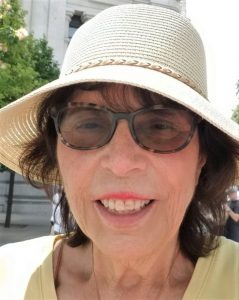Roberta M. Ward

Since I was very young, I knew that my father was born in Jassy, Romania, the historical name of Romania’s second-largest city, which is now known as Iasi. Whenever I heard anything in the news about Romania, I would listen intently. When I met Romanians, I would announce proudly that my father was born in Jassy, and they would all exclaim that it was a beautiful city.
In September 2022, after the travel bans of the COVID pandemic, I was looking for something meaningful to do and finally made time to travel to Romania. My first stop was Bucharest, a large, sprawling city with a haphazard jumble of buildings — some modern, some elegant Art Nouveau style and some Communist-era gray concrete megalithic apartment blocks constructed to house thousands of people cheaply. There was graffiti everywhere and billboards with ads. Capitalism has flourished in Romania since the fall of the Communist dictator Nicolae Ceaușescu, and Western brands are omnipresent — hotel chains like the Radisson and Hilton, and clothing and accessories, like Gucci and Zara.
In Bucharest, I visited large synagogues with crystal chandeliers, colorful stained-glass windows with Stars of David and marble tablets with engraved names of founders of the congregation. However, the synagogues were museums, with guides who lecture about the past history of the once flourishing Jewish population of Romania and show visitors gruesome black-and-white photos of the massacres and mass deportations of Jews during the Second World War by Romanian and German fascists. The once-populous Jewish section of Bucharest is an ordinary tree-lined middle-class Romanian neighborhood, as the Jews who remained after World War II have immigrated to Israel. The Communist regime of Ceausescu encouraged the emigration of Jews and extorted a bounty for each emigrating Jew from the State of Israel as compensation for the money the Romanian government had supposedly invested in their education.
‘I went to the National Archives’
On my second day in Iasi, I took a Jewish heritage tour and discovered that the heritage of my ancestors would have been extermination if they hadn’t escaped to America in 1912.
On the eve of the Second World War, there were 35,000 Jews in Iasi, about one-third of the population. Then, in June, 1941, the worst massacre of Jews in Romanian history took place in Iasi: the Iasi pogrom. Iasi has a small Holocaust museum housed in a former police station. In the courtyard were photos of dead and dying Jews who were shot and bludgeoned by Romanian police and civilians in that courtyard during the massacre. Inside the building, I watched a video narrated by survivors who tell a horrendous tale of innocent Jewish men, ignorant of their fate, who survived the shootings and beatings in the police courtyard but were subsequently herded to the rail station and packed into cattle cars, locked in, windows nailed shut, deprived of all air, food and water, with cow manure and lime on the floor, and then shuttled aimlessly back and forth for days. Most died of asphyxiation and dehydration. The few survivors were then forced to throw the Jewish corpses of their neighbors from the cattle cars into large pits that had been dug in the Jewish cemetery outside of Iasi — mass rectangular graves covered by cement lids.
The small Jewish community that remains in Iasi of about 200 Jews has a community center — a small, locked compound of squat buildings surrounded by a fence. I was told to go there to ask for records of my family. They reluctantly admitted me but said that they only have records of Jewish people who died in Iasi. Thus, I went to the National Archives to search for records. Luckily, the National Archives building in Iasi is across the street from the university where I was teaching legal English to Romanian law students. It was necessary to speak Romanian to ask for documents, so I brought one of my Romanian student assistants with me one brisk morning. The tiny entryway has only a small window through which you can ask for documents, so we sat on a cold stone bench in a park to fill out the forms. I received the answer by email a few weeks later that no records were found of my family, and that it was possible to go into the archives and search hand-written books and records myself. But that would take days and even weeks.
Sadly, my journey to discover my roots in Romania ended with my finding out a lot about the history of Romania and the Jews, but nothing about my own family’s past. Thus, I packed my bags and departed in the middle of the night for the Bucharest airport with a mixture of relief … and regret.
Roberta M. Ward grew up in Baltimore and today lives in California, where she teaches legal English and English composition to international students. She was a regular contributor to “Reflections: Stories by the Folsom Senior Memoir Writing Class,” where many of her memoirs have been published.






